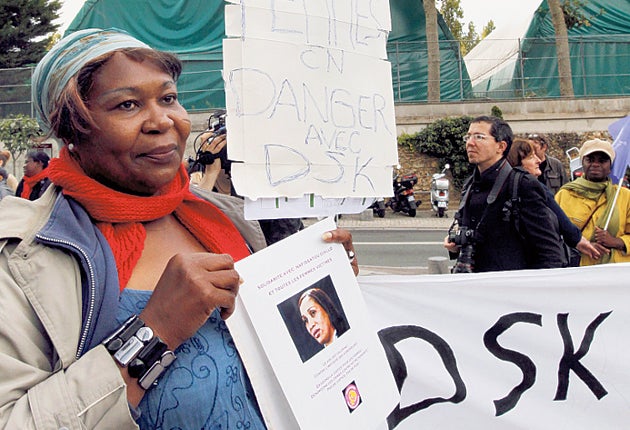French are divided over Strauss-Kahn's sincerity

Your support helps us to tell the story
From reproductive rights to climate change to Big Tech, The Independent is on the ground when the story is developing. Whether it's investigating the financials of Elon Musk's pro-Trump PAC or producing our latest documentary, 'The A Word', which shines a light on the American women fighting for reproductive rights, we know how important it is to parse out the facts from the messaging.
At such a critical moment in US history, we need reporters on the ground. Your donation allows us to keep sending journalists to speak to both sides of the story.
The Independent is trusted by Americans across the entire political spectrum. And unlike many other quality news outlets, we choose not to lock Americans out of our reporting and analysis with paywalls. We believe quality journalism should be available to everyone, paid for by those who can afford it.
Your support makes all the difference.More than one-fifth of the French population watched Dominique Strauss-Kahn deliver a blend of tearful confession and belligerent counter-attack in a televised interview on Sunday night.
Contrite or combative? Sincere or scripted? Convincing or ridiculous? Politicians and media commentators were divided yesterday on the effect of the former head of the International Monetary Fund's his first lengthy declaration since he was arrested in New York in May on suspicion of trying to rape a hotel chambermaid.
Mr Strauss-Kahn's 25-minute interview on the TF1 evening news bulletin, conducted by Claire Chazal, a friend of his wife Anne Sinclair, attracted 13.4 million viewers – the highest for a news programme since the riots of November 2005.
The former presidential front-runner apologised to the French people and his wife for his "moral failing", but said that his brief sexual encounter with the Guinean maid, Nafissatou Diallo, was neither "violent" nor "paid for". He accused Ms Diallo of lying, possibly for financial gain, and made it clear that he hoped, eventually, to resume his political career.
Mr Strauss-Kahn, a former French finance minister, returned home two weeks ago soon after the case against him collapsed. He told viewers: "What happened [in the Sofitel hotel in New York] was more than an inappropriate relation. It was an error ... I displayed a moral failing, which was hurtful to my wife and to the French people ... a failing of which I am not proud." As a result, he said, he had "missed his rendezvous with the French people" in next spring's presidential election. "I regret it infinitely. I will regret it all my life," he added.
Many media commentators said they were "disturbed" or "revolted" by what they described as a choreographed attempt by the Socialist politician to apologise and launch a counter-offensive at the same time. They said Mr Strauss-Kahn had been allowed to get away with using the vague and carefully chosen phrase "moral failing" without being pressed to say exactly what did happen in his nine-minute encounter with Ms Diallo on 14 May.
But some commentators and political colleagues said they thought Mr Strauss-Kahn, 62, had taken a well-judged first step towards reconstructing his political career. Dominique Wolton, a communications specialist, said Mr Strauss-Kahn was "convincing, sincere and moving".
A spokesperson for French feminist groups, however, said she was "sickened" that Mr Strauss-Kahn had been given a friendly platform to "do what powerful men always do" and present female victims as "fantasists".
There was special anger that Mr Strauss-Kahn, after apologising for his moral failings, went on to hint that he believed he was the victim of a trap or maybe even a plot. The centre-left newspaper Libération said that Mr Strauss-Kahn had tried to stir up trouble by raising this "unconvincing scenario" without an "ounce of proof".
There was also unease that he was allowed to brush away, without much challenge by his interviewer, the allegations of attempted rape brought by a French writer, Tristane Banon, 34. Ms Banon, then a close friend of Mr Strauss-Kahn's daughter, came forward in June to claim he attacked her during an interview in an empty flat in Paris in 2004.
During his TV interview, Mr Strauss-Kahn said her account of the incident was "imaginary". Questioned by police last week, he gave a rather different story. He admitted making "advances" to Ms Banon but said that he stopped when she objected.
Join our commenting forum
Join thought-provoking conversations, follow other Independent readers and see their replies
Comments